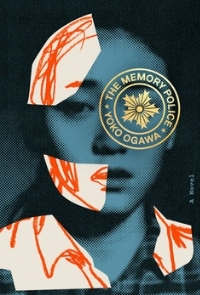
The Memory Police
Written by: Yoko Ogawa
Reviewed by: Joe Bones
Genre: Science-Fiction / Speculative
Score: 4/5
At first, this will all sound familiar. An isolated country, ruled as a police state. Resources are scarce and the country’s inhabitants live simple lives. Luxury items are gradually outlawed and destroyed en masse. Anyone who does not comply is subject to interrogation or arrest by secret police. Paranoia festers as people begin to disappear in the night and hope is diminished by life’s increasing bleakness.
In The Memory Police, author Yoko Ogawa has crafted such a world while adding a major twist. Within the island nation where the story takes place, items disappear along with associated memories and experiences. For most of the islanders, once something disappears, it is gone forever. However, there are those who do not forget, whose intact memories of disappeared items make them targets of the Memory Police.
The Memory Police, translated by Stephen Snyder and Markus Juslin, follows an unnamed novelist as she hides her editor from the agents of the Memory Police. This narrative is intercut with scenes from the main character’s most recent novel. Each of these narratives gives the reader a different perspective on the situation the novelist finds herself in and offers a unique examination of the island’s society.
In my opinion, Ogawa uses the novel’s futuristic, dystopian setting to explore the mechanisms of communism (or maybe fascism, though no dictator or ruling party is ever named) from the lowly but committed perspective of the main character. Unlike similar dystopian works, which focus on the rise and transition into communism and the resulting societal and political shifts, Ogawa starts in the middle and imagines its ultimate conclusion.
The story shows what might happen if communism were allowed to fully run its course and incorporate all people, labor, and goods into an ideal unified gestalt. In addition, as I mentioned above, it’s never clear who the Memory Police are taking orders from. The presence of a secret police is scary enough on its own; having no knowledge of who is pulling the strings makes the situation all the more terrifying. This purposeful narrative exclusion adds a further element of tension that simmers beneath the surface of Ogawa’s tranquil prose.
Published last year, The Memory Police was nominated for the Booker International Prize and won the World Book Award for Translated Literature. I haven’t read the novel in Japanese, but I feel that the translation is very well done. This novel deserves a place alongside other great works of dystopian literature. Its dream-like examination of life in a police state is a masterwork of speculative fiction.
There’s one more aspect of the novel I’d like to examine, but it requires me to reveal a few minor SPOILERS. With that said, please read on:
The novel’s central concept was my favorite aspect of this book. Unfortunately, it also factored into my major complaint. Ogawa’s main character is a novelist and the tale starts at the height of the Memory Police’s regime. In a world where an item can vanish at any time and the very memory of that item can be outlawed, how could anyone ever make a living writing novels? How is there a market for something that will have to be burned just for containing a newly disappeared word?
There is a point in the story where novels themselves disappear. During this chapter we hear tell of the main character’s friends and neighbors getting rid of her books. Plus, she has a huge personal collection of them herself. So large in fact, that she must choose which to hide and which to sacrifice. It just doesn’t make sense to me. As well thought out and plotted as every other theme and story thread is, the decision to make the main character a novelist winds up almost feeling like an oversight, as if the author didn’t fully consider the implications of the world she envisioned while designing the main character. For me, this was the one scuff mark on an otherwise shining piece of science-fiction.
Recent Comments